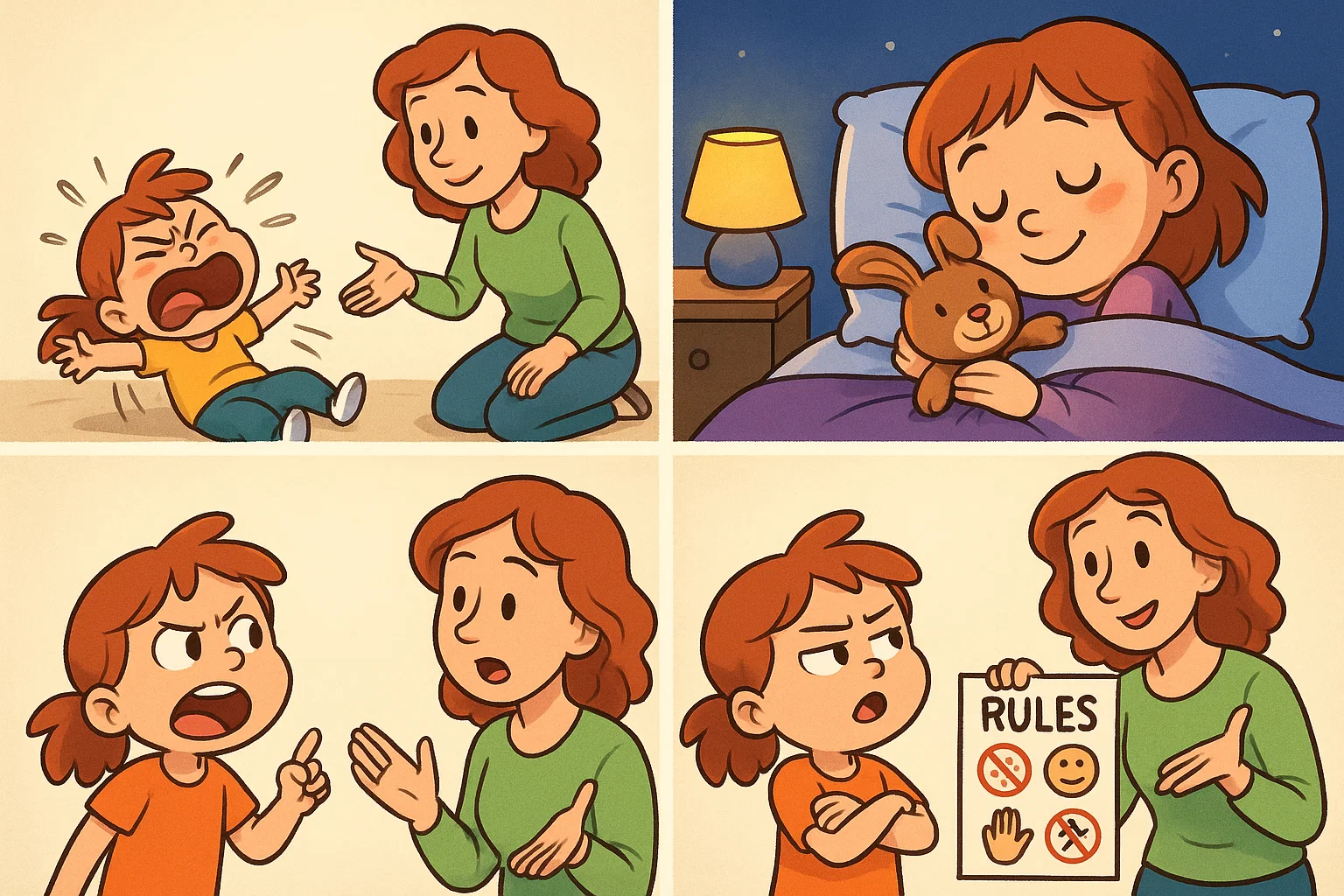Parenting is one of the most rewarding yet challenging journeys in life. For teachers, therapists, and caregivers, interactions with parents can sometimes become as complex as working directly with children. A child may struggle with tantrums, problem behavior, or big emotions, and when parents respond in ways that are intrusive, dismissive, or overly critical, the situation can escalate quickly. Dealing with difficult parenting situations requires patience, structured parenting strategies, and clear communication.
Below, we’ll explore classic scenarios, everyday challenges, and constructive solutions that may help you deal with difficult interactions, whether at home or school.
Classic Difficult Parent Scenarios
Parents come in all personalities, and while most want to help their child, some behaviors create fraught relationships with professionals or family members. Recognizing these patterns is the first step to creating an action plan.
Intrusiveness
Some parents cross boundaries with constant calls, unannounced visits, or micromanaging daily routines. While they may think their involvement reassures their child, it can overwhelm teachers and counselors. Setting limits, such as agreed communication times, and calmly explaining why boundaries matter may help.
Laziness and Dependency
Some parents rely too much on teachers, relatives, or organizations, avoiding responsibility. For example, they might expect the school to manage their child’s ADHD without support at home. In these cases, gently redirect responsibility while still offering advice to help. Encouraging small, manageable tasks reassures them they can contribute.
Blaming and Criticism
Highly critical parents may accuse teachers or even their own child of failures. They may yell or seem angry in meetings. The most effective approach is to remain calm, listen without judgment, and redirect the focus toward solutions. Phrases like, “Let’s think together about what might help your child manage their feelings” can de-escalate tension.
Dishonesty
Some parents avoid the truth about attendance, home environment, or problem behavior. Dishonesty erodes trust. It’s helpful to document facts, involve a third-party when necessary, and calmly present evidence. Reassuring your child or student that honesty helps everyone stay safe is equally vital.
Irresponsibility
Neglecting homework, skipping doctor appointments, or ignoring bedtime routines reflects irresponsibility. This can leave younger children confused or without support. Here, teachers can use redirection, praising small steps forward, and encouraging accountability.
The Innocent Façade
Perhaps most challenging are manipulative parents who appear agreeable but act differently behind the scenes. Recognizing patterns early, keeping clear written records, and asking questions that require specific answers may be helpful.
Everyday Parenting Scenarios and Solutions

Beyond parent-to-professional interactions, families face daily challenges with kids’ needs. Here are some common situations where structured parenting strategies can make a difference.
Tantrums and Emotional Outbursts
Tantrums are common in younger children, especially when they don’t yet have words to explain big emotions. Triggers might include transitions, tiredness, or hunger.
Short-term management strategies:
- Remain calm and avoid escalating.
- Give your child time to process feelings.
- Offer redirection with toys or activities.
Long-term strategies:
- Establish a routine to reduce unpredictability.
- Use praise when your child manages frustration without an outburst.
- Afterward, talk with the child to help them name and understand their feelings.
Setting Limits Without Conflict
Boundaries help children and young people feel secure. To avoid conflict:
- Use age-appropriate explanations.
- Let them know what behavior is expected.
- Reassure your child when they cooperate.
If your child is acting manipulative, calmly state consequences, but follow through consistently.
Bedtime Resistance
Bedtime struggles often appear when children want “one more story” or extra attention. A predictable bedtime routine might help: dim lights, quiet play, and special time together. Avoid yelling; instead, reassure them and make them feel safe.
| Age Group | Helpful Bedtime Strategies |
| Younger children | Reading, cuddly toy, soft music |
| School-age kids | Clear bedtime rules, consistent lights-out |
| Teens | Encourage screen-free wind-down and involve them in planning their routine |
Rudeness and Back Talk
Back talk can be a way children test independence or signal stress. Instead of escalating, calmly acknowledge their feelings: “I hear you’re upset, but let’s talk respectfully.” Praise polite communication to reinforce positive behavior.
Conflict Between Parents and Teachers
In schools, conflict may occur when parents challenge teachers about grades, behavior, or classroom management.
Recognizing Different Types of Challenging Parents
Common categories include:
- The “angel child” parent: insists their child never misbehaves.
- The “your problem now” parent: avoids accountability.
- The questioning parent: constantly doubts teacher expertise.
Each type requires a tailored strategy to manage emotions and refocus on the child’s learning.
Building Communication Bridges
It’s helpful to use structured communication, such as:
- “I want to talk about strategies that might help your child succeed.”
- “Your perspective may be helpful. Can we explore different strategies together?”
Active listening without judgment reassures parents that their voice matters.
Collaborative Solutions for Student Benefit
When conflict escalates, bring the focus back to the student:
- Develop an action plan that includes home and school steps.
- Ask for help from school counsellors if needed.
- Highlight shared goals: supporting your child’s growth and emotional health.
Key Communication Strategies

Challenging conversations can feel fraught, but communication tools make them manageable.
Listening Without Judgment
Give parents or children time to process. Nodding, summarizing their concerns, and avoiding interruptions may be helpful. This reassures them you value their perspective.
Using Clear and Respectful Language
Instead of yelling or criticizing, use calm sentence starters:
- “Let’s think about what might help…”
- “I understand this may be difficult…”
- “Here’s what we can try at home or school.”
Setting Healthy Boundaries
Boundaries prevent burnout. You might say:
- “I can discuss this during our scheduled time.”
- “That decision needs both school and family input.”
Boundaries let parents know you respect them while protecting your role.
Long-Term Coping and Personal Growth

Coping With Emotional Burden
Teachers, caregivers, and even children themselves may be feeling overwhelmed. Taking some time for self-care—exercise, journaling, or special time with supportive friends—helps manage big emotions.
Seeking Professional Guidance
If you’re worried about your child’s long-term well-being, extra support from a counsellor may be helpful. Professional organisations and helplines also provide guidance.
Letting Go of Control
Not every situation can be solved. Sometimes, the healthiest step is accepting limits. Remaining calm, focusing on what you can influence, and praising progress can bring peace of mind.
Dealing with difficult parenting situations—whether managing tantrums at home, handling dishonest or manipulative parents, or resolving conflict at school—requires patience, resilience, and thoughtful strategies. By staying calm, setting boundaries, and using constructive parenting strategies, you give your child the support they need to manage their feelings and grow.
If you think your child might need extra support, or if you’re worried about your child’s behavior at home or school, don’t hesitate to ask for help from a counsellor, teacher, or helpline. What matters most is ensuring children feel safe, supported, and empowered to thrive.


